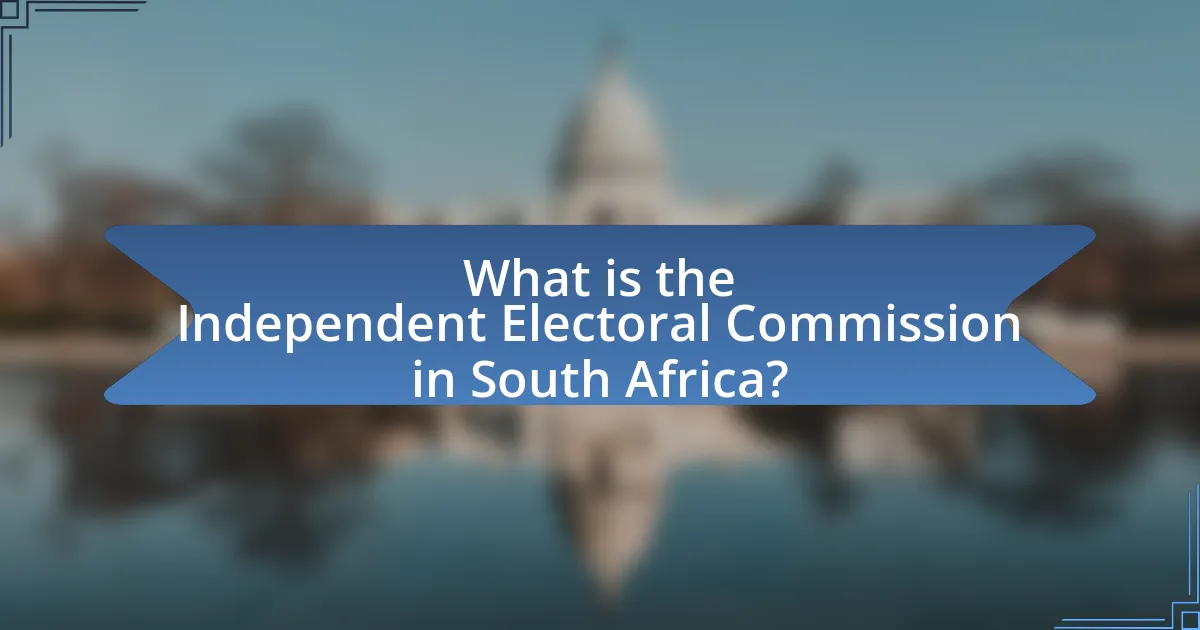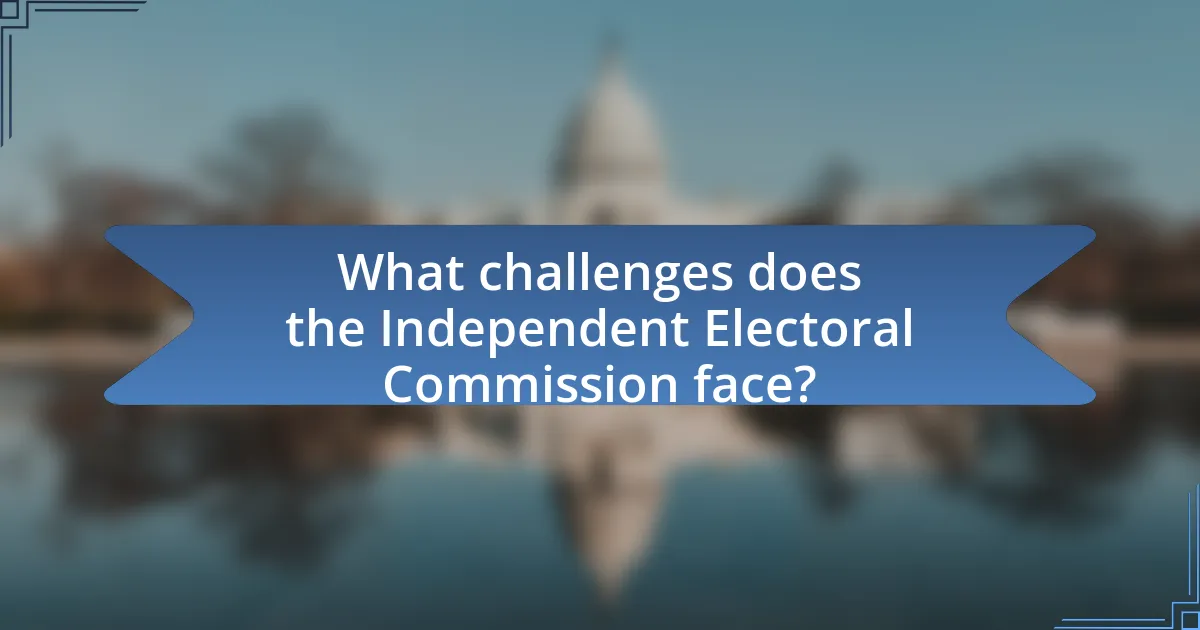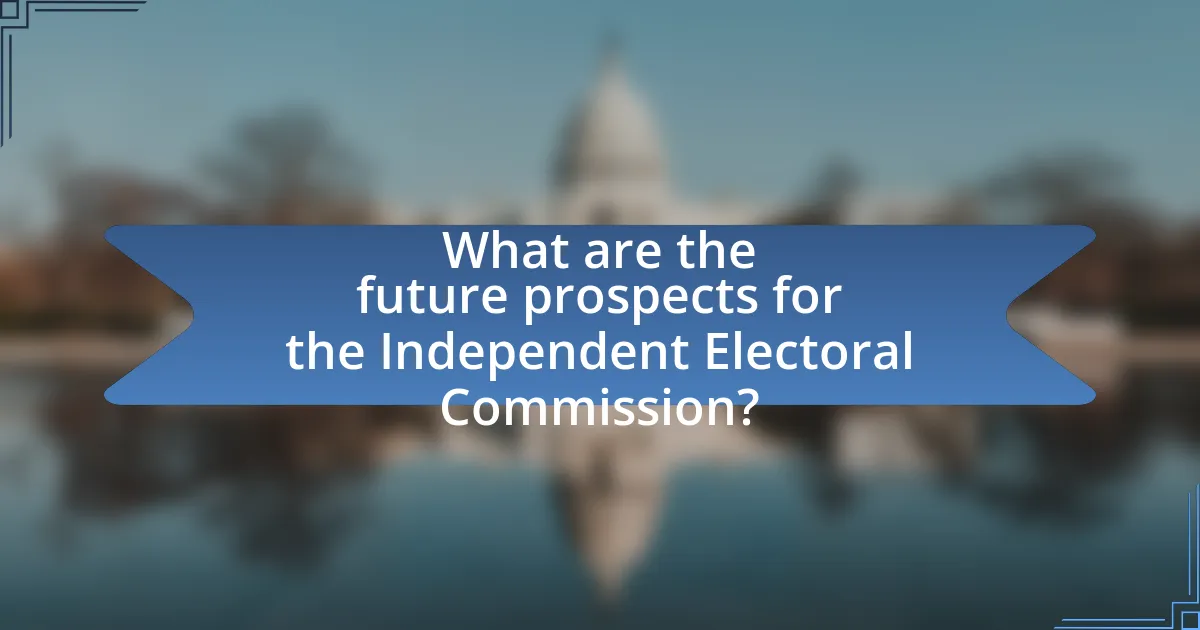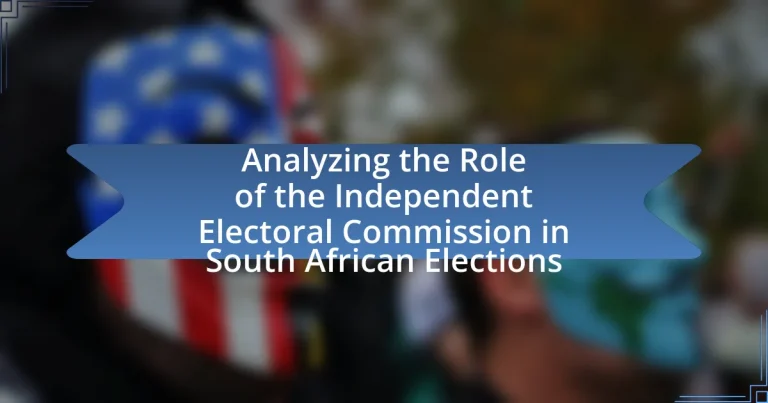The Independent Electoral Commission (IEC) in South Africa is an autonomous body established by the Constitution to oversee elections, ensuring their integrity and fairness. This article analyzes the IEC’s formation, legal framework, and primary functions, including voter registration and election management. It also addresses the challenges faced by the IEC, such as political interference and logistical issues, while highlighting its role in promoting voter education and public trust. Furthermore, the article explores the impact of technology on the electoral process and outlines recommendations for enhancing the IEC’s operations and credibility in future elections.

What is the Independent Electoral Commission in South Africa?
The Independent Electoral Commission (IEC) in South Africa is an autonomous body established by the Constitution to manage and oversee elections in the country. The IEC is responsible for ensuring free and fair elections, which includes conducting national, provincial, and local elections, as well as referendums. Established in 1996, the IEC operates independently from the government and political parties, ensuring impartiality in the electoral process. Its mandate includes voter registration, the management of the electoral process, and the promotion of democratic participation, which is crucial for maintaining the integrity of South Africa’s democratic system.
How was the Independent Electoral Commission established?
The Independent Electoral Commission (IEC) was established through the enactment of the Electoral Commission Act of 1996 in South Africa. This legislation was a response to the need for an independent body to oversee free and fair elections following the end of apartheid. The IEC was tasked with managing the electoral process, ensuring compliance with electoral laws, and promoting voter education. The establishment of the IEC marked a significant step in South Africa’s transition to democracy, as it aimed to enhance the integrity and transparency of elections, which is crucial for a functioning democratic system.
What were the key events leading to its formation?
The key events leading to the formation of the Independent Electoral Commission (IEC) in South Africa include the end of apartheid, the establishment of a democratic government, and the adoption of a new constitution. The transition from apartheid to democracy in the early 1990s necessitated a credible electoral body to oversee free and fair elections. In 1994, the first democratic elections were held, and the IEC was officially established to manage this process, ensuring transparency and integrity in the electoral system. The IEC’s formation was further solidified by the Constitutional Assembly’s work, which enshrined its independence and authority in the 1996 Constitution, thereby institutionalizing its role in South African elections.
What legal framework supports the Independent Electoral Commission?
The legal framework that supports the Independent Electoral Commission (IEC) in South Africa is primarily established by the Constitution of the Republic of South Africa, 1996, specifically in Chapter 9, which outlines the establishment and functions of independent institutions. The Electoral Commission Act of 1996 further details the powers, functions, and responsibilities of the IEC, ensuring its independence and impartiality in conducting free and fair elections. These legal provisions are designed to uphold democratic principles and ensure the integrity of the electoral process in South Africa.
What are the primary functions of the Independent Electoral Commission?
The primary functions of the Independent Electoral Commission (IEC) include overseeing and managing the electoral process in South Africa, ensuring free and fair elections, and promoting voter education. The IEC is responsible for conducting national and provincial elections, as mandated by the Electoral Commission Act of 1996, which establishes its authority to regulate the electoral framework. Additionally, the IEC monitors compliance with electoral laws and facilitates the registration of voters, thereby enhancing democratic participation.
How does the Independent Electoral Commission manage elections?
The Independent Electoral Commission (IEC) manages elections by overseeing the entire electoral process, ensuring free and fair elections in South Africa. The IEC is responsible for voter registration, the design and printing of ballots, the establishment of polling stations, and the training of election officials. Additionally, the commission conducts public awareness campaigns to educate citizens about the voting process and their rights. The IEC also monitors the electoral environment to prevent malpractice and ensure compliance with electoral laws, as evidenced by its mandate established in the Electoral Commission Act of 1996, which outlines its authority and responsibilities in managing elections.
What role does the Independent Electoral Commission play in voter education?
The Independent Electoral Commission (IEC) plays a crucial role in voter education by providing information and resources to ensure that citizens understand the electoral process. The IEC conducts campaigns that inform voters about their rights, the voting process, and the importance of participating in elections. For instance, the IEC utilizes various platforms, including social media, community workshops, and educational materials, to reach diverse populations and enhance voter awareness. This approach is supported by the IEC’s mandate under the Electoral Commission Act, which emphasizes the importance of promoting public awareness of electoral matters.
Why is the Independent Electoral Commission important for democracy in South Africa?
The Independent Electoral Commission (IEC) is crucial for democracy in South Africa because it ensures free and fair elections, which are fundamental to a functioning democracy. The IEC is responsible for managing the electoral process, including voter registration, the conduct of elections, and the announcement of results. Its independence is protected by the Constitution of South Africa, which mandates that the commission operates without interference from the government or political parties. This independence is vital for maintaining public trust in the electoral system, as evidenced by the IEC’s successful management of multiple national and provincial elections since its establishment in 1997, which have been recognized by international observers for their integrity and transparency.
How does the Independent Electoral Commission ensure free and fair elections?
The Independent Electoral Commission ensures free and fair elections by implementing strict regulations and oversight mechanisms throughout the electoral process. This includes the establishment of an independent electoral management body that operates without political interference, ensuring transparency in voter registration, and conducting impartial monitoring of the election process. Additionally, the Commission conducts public education campaigns to inform citizens about their voting rights and the electoral process, which enhances voter participation and trust. The use of technology, such as electronic voting systems and secure ballot boxes, further safeguards the integrity of the elections. These measures are supported by legal frameworks, such as the Electoral Act, which outlines the Commission’s responsibilities and powers to enforce compliance among political parties and candidates.
What impact does the Independent Electoral Commission have on public trust in elections?
The Independent Electoral Commission significantly enhances public trust in elections by ensuring transparency, fairness, and accountability in the electoral process. This body conducts free and fair elections, which are critical for democratic legitimacy. For instance, the commission’s adherence to established electoral laws and its independent oversight of the voting process help mitigate allegations of fraud and bias. According to a 2021 survey by the Electoral Commission of South Africa, 75% of respondents expressed confidence in the commission’s ability to manage elections effectively, demonstrating a direct correlation between the commission’s actions and public trust levels.

What challenges does the Independent Electoral Commission face?
The Independent Electoral Commission faces challenges such as ensuring electoral integrity, managing logistical issues, and addressing public trust. Electoral integrity is compromised by incidents of fraud and manipulation, which undermine the credibility of the electoral process. Logistical issues include the organization of polling stations, distribution of ballots, and ensuring adequate staffing, which can lead to inefficiencies and voter disenfranchisement. Additionally, public trust is affected by perceptions of bias and transparency, as evidenced by surveys indicating that a significant portion of the electorate questions the Commission’s impartiality. These challenges collectively hinder the Commission’s ability to conduct free and fair elections in South Africa.
How does political interference affect the Independent Electoral Commission?
Political interference undermines the integrity and effectiveness of the Independent Electoral Commission (IEC) by compromising its autonomy and impartiality. When political entities exert influence over the IEC, it can lead to biased decision-making, manipulation of electoral processes, and erosion of public trust in the electoral system. For instance, in South Africa, instances of political pressure have historically resulted in challenges to the IEC’s ability to conduct free and fair elections, as seen during the 2019 national elections when allegations of undue influence were raised. This interference can manifest in various forms, including funding pressures, appointment of commission members, and public statements that may sway the commission’s actions, ultimately jeopardizing the democratic process.
What are examples of political challenges encountered by the Independent Electoral Commission?
The Independent Electoral Commission faces several political challenges, including allegations of bias, interference from political parties, and threats to its independence. Allegations of bias often arise from political parties that claim the Commission favors certain candidates or parties, undermining public trust. Interference from political parties can manifest in attempts to influence the Commission’s decisions or operations, which can compromise its neutrality. Additionally, threats to the Commission’s independence may come from government entities or political groups seeking to exert control over electoral processes, as seen in various instances where political pressure has been applied to influence electoral outcomes. These challenges can hinder the Commission’s ability to conduct free and fair elections, which is essential for a democratic society.
How does the Independent Electoral Commission respond to allegations of bias?
The Independent Electoral Commission (IEC) responds to allegations of bias by conducting thorough investigations into the claims and ensuring transparency in its operations. The IEC emphasizes its commitment to impartiality and fairness, often releasing public statements to clarify its position and outline the steps taken to address any concerns. For instance, the IEC has mechanisms in place, such as public hearings and stakeholder consultations, to gather feedback and demonstrate accountability, reinforcing its role as an independent body in the electoral process.
What logistical challenges does the Independent Electoral Commission encounter during elections?
The Independent Electoral Commission encounters several logistical challenges during elections, including the distribution of voting materials, ensuring adequate staffing at polling stations, and managing the transportation of ballot boxes. For instance, the commission must coordinate the timely delivery of ballots and voting equipment to remote areas, which can be hindered by poor infrastructure and limited access. Additionally, recruiting and training sufficient personnel to manage polling stations is critical, as a shortage can lead to long wait times and voter frustration. These challenges are compounded by the need for effective communication and public awareness campaigns to inform voters about the electoral process, which is essential for maximizing voter turnout and ensuring a smooth election day.
How does the Independent Electoral Commission address issues of accessibility for voters?
The Independent Electoral Commission addresses issues of accessibility for voters by implementing various measures to ensure that all citizens can participate in elections. These measures include providing accessible polling stations, offering assistance to individuals with disabilities, and utilizing technology to facilitate voting for those with special needs. For instance, the Commission has established guidelines that require polling places to be equipped with ramps and other accessibility features, ensuring compliance with the South African Constitution’s commitment to inclusive democracy. Additionally, the Commission conducts outreach programs to educate voters about their rights and the resources available to assist them, thereby enhancing voter participation among marginalized groups.
What measures are in place to ensure security during elections?
The Independent Electoral Commission (IEC) of South Africa implements several measures to ensure security during elections. These measures include the deployment of trained security personnel at polling stations, the use of secure ballot boxes, and the establishment of protocols for monitoring and reporting any irregularities. Additionally, the IEC collaborates with law enforcement agencies to maintain order and prevent electoral violence, ensuring that the electoral process is conducted safely and fairly. The effectiveness of these measures is supported by historical data showing a decrease in election-related incidents over recent electoral cycles, reflecting the IEC’s commitment to secure and credible elections.
How does public perception influence the effectiveness of the Independent Electoral Commission?
Public perception significantly influences the effectiveness of the Independent Electoral Commission (IEC) by shaping trust and legitimacy in its operations. When the public views the IEC as impartial and competent, voter confidence increases, leading to higher electoral participation and acceptance of election outcomes. Conversely, negative perceptions, often fueled by allegations of bias or inefficiency, can undermine the commission’s authority and the overall electoral process. For instance, a 2021 survey indicated that 65% of South Africans believed the IEC was doing a good job, correlating with increased voter turnout in subsequent elections. This demonstrates that positive public perception directly enhances the IEC’s effectiveness by fostering a conducive environment for democratic engagement.
What surveys or studies have been conducted on public trust in the Independent Electoral Commission?
Surveys and studies on public trust in the Independent Electoral Commission (IEC) include the “South African Social Attitudes Survey” conducted by the Human Sciences Research Council, which assesses public perceptions of the IEC’s credibility and effectiveness. Additionally, the “Electoral Commission of South Africa’s Public Opinion Survey” provides insights into voter confidence in the IEC’s ability to conduct free and fair elections. These studies reveal varying levels of trust, often influenced by political events and electoral outcomes, highlighting the importance of the IEC’s role in maintaining electoral integrity.
How can the Independent Electoral Commission improve its image among voters?
The Independent Electoral Commission can improve its image among voters by enhancing transparency and communication. By regularly publishing detailed reports on electoral processes and decisions, the Commission can build trust with the electorate. For instance, the 2021 local government elections in South Africa saw increased scrutiny, and the Commission’s proactive engagement through public forums and social media helped clarify its role and decisions, leading to a more informed voter base. Additionally, implementing feedback mechanisms for voters to express concerns can further demonstrate the Commission’s commitment to accountability and responsiveness.

What are the future prospects for the Independent Electoral Commission?
The future prospects for the Independent Electoral Commission (IEC) in South Africa include enhanced electoral integrity, increased public trust, and improved technological integration. The IEC is expected to implement advanced voting technologies and streamline processes to ensure transparency and efficiency in elections. Historical data shows that the IEC has successfully managed multiple national elections since its establishment in 1994, demonstrating its capacity to adapt and evolve. Furthermore, ongoing reforms and public engagement initiatives aim to strengthen the commission’s credibility and responsiveness to citizen needs, which are critical for maintaining democratic processes in the country.
How is technology shaping the future of the Independent Electoral Commission?
Technology is shaping the future of the Independent Electoral Commission by enhancing the efficiency, transparency, and security of electoral processes. The integration of electronic voting systems, for instance, has streamlined the voting process, reducing the time required for vote counting and minimizing human error. Additionally, the use of biometric verification systems has improved voter authentication, thereby increasing the integrity of the electoral roll. According to a report by the Electoral Commission of South Africa, the implementation of technology in elections has led to a significant reduction in electoral fraud incidents, reinforcing public trust in the electoral system. Furthermore, data analytics tools are being utilized to analyze voter behavior and preferences, allowing the Commission to tailor its outreach and engagement strategies effectively.
What innovations are being implemented to enhance the electoral process?
Innovations being implemented to enhance the electoral process include the use of electronic voting machines, biometric voter registration, and online voter education platforms. Electronic voting machines streamline the voting process, reduce human error, and improve the speed of results reporting. Biometric voter registration enhances security and ensures that each vote is cast by a verified individual, thereby reducing fraud. Online voter education platforms provide accessible information to voters, increasing awareness and participation in elections. These innovations collectively aim to improve the integrity, efficiency, and accessibility of the electoral process in South Africa.
How can technology improve voter engagement and participation?
Technology can improve voter engagement and participation by providing accessible platforms for information dissemination and facilitating easier voting processes. For instance, mobile applications and websites can offer real-time updates on election dates, candidate information, and polling locations, which enhances voter awareness. According to a study by the Pew Research Center, 60% of voters reported that they used online resources to gather information about candidates and issues in the 2020 elections, indicating a significant reliance on technology for informed decision-making. Additionally, electronic voting systems can streamline the voting process, reduce wait times, and increase overall participation, as evidenced by the successful implementation of electronic voting in countries like Estonia, where voter turnout increased to over 40% for online voting options.
What reforms are necessary for the Independent Electoral Commission to adapt to changing political landscapes?
The Independent Electoral Commission (IEC) requires reforms such as enhanced transparency, improved technology integration, and increased public engagement to adapt to changing political landscapes. Enhanced transparency can be achieved through regular audits and public reporting of electoral processes, which builds trust and accountability. Improved technology integration, including the use of secure online voting systems and real-time results reporting, can streamline operations and increase voter participation. Increased public engagement through educational campaigns and outreach programs can ensure that citizens are informed about the electoral process and their voting rights. These reforms are essential as they address the evolving demands of a diverse electorate and the complexities of modern political dynamics in South Africa.
What recommendations have been made for improving the Independent Electoral Commission’s operations?
Recommendations for improving the Independent Electoral Commission’s operations include enhancing transparency, increasing public engagement, and adopting advanced technology for electoral processes. Transparency can be improved by publishing detailed reports on electoral activities and decisions, which fosters public trust. Increasing public engagement involves conducting outreach programs to educate citizens about the electoral process, thereby encouraging higher voter participation. The adoption of advanced technology, such as electronic voting systems and online voter registration, can streamline operations and reduce the potential for human error. These recommendations are supported by various studies indicating that transparency and technology significantly enhance electoral integrity and efficiency.
How can the Independent Electoral Commission strengthen its independence and credibility?
The Independent Electoral Commission can strengthen its independence and credibility by implementing transparent processes and ensuring accountability in its operations. By adopting clear guidelines for electoral procedures and making them publicly accessible, the Commission can foster trust among voters. Additionally, establishing an independent oversight body to review its actions and decisions can enhance accountability. Historical evidence shows that electoral commissions with robust transparency measures, such as those in Canada and Germany, have successfully maintained public confidence in their electoral processes.
What best practices can be adopted by the Independent Electoral Commission for future elections?
The Independent Electoral Commission can adopt several best practices for future elections, including enhancing voter education, improving technology for voting and counting, and ensuring transparency in the electoral process. Enhanced voter education initiatives can increase public awareness and participation, as evidenced by the 2019 South African elections where voter turnout was significantly influenced by targeted educational campaigns. Improving technology, such as implementing secure electronic voting systems, can streamline the voting process and reduce errors, as demonstrated by successful implementations in other countries. Ensuring transparency through independent audits and public reporting can build trust in the electoral process, which is crucial for democratic integrity, as highlighted by international observers during past elections.
What lessons can be learned from other countries’ electoral commissions?
Countries’ electoral commissions demonstrate the importance of transparency, impartiality, and public engagement in the electoral process. For instance, the Electoral Commission of Canada emphasizes transparency by publishing detailed reports on election financing and procedures, which fosters public trust. Additionally, the Independent Electoral and Boundaries Commission of Kenya showcases the necessity of technology in enhancing electoral integrity, as seen in their use of biometric voter registration to reduce fraud. These examples illustrate that effective electoral commissions prioritize clear communication, utilize technology for accuracy, and engage citizens to ensure fair elections.
How can the Independent Electoral Commission foster collaboration with civil society organizations?
The Independent Electoral Commission can foster collaboration with civil society organizations by establishing formal partnerships and communication channels. These partnerships can facilitate joint initiatives aimed at promoting voter education, enhancing electoral transparency, and monitoring electoral processes. For instance, the Commission can engage civil society organizations in training programs that empower them to assist in voter registration drives, thereby increasing voter participation. Additionally, by involving these organizations in the electoral observation process, the Commission can enhance the credibility of elections, as civil society groups often have the capacity to mobilize communities and provide independent assessments of the electoral environment. This collaborative approach is supported by the fact that successful electoral processes often rely on the active participation of diverse stakeholders, including civil society, to ensure accountability and public trust in the electoral system.

